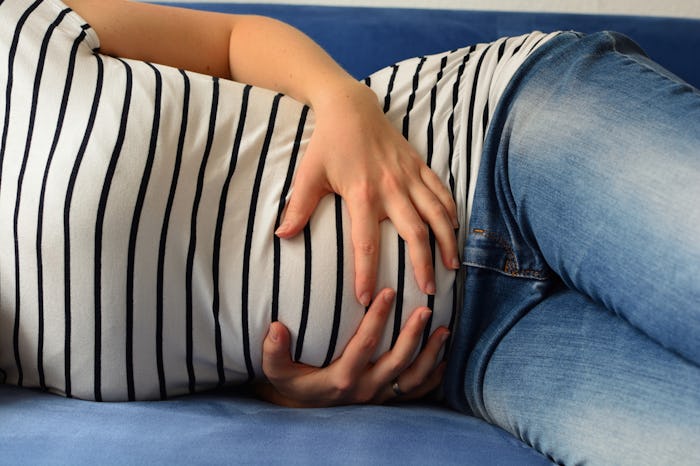The world seems to finally be catching on to the idea that Postpartum Depression is a serious issue for many women. For years, it was downplayed as sort of one of those things moms went through after having a baby, a mystery that could not be solved. I mean, it was even referred to as the "baby blues" for decades, as though PPD was just this cute affliction that could be explained away with a nickname. Right. Fortunately, scientists are working hard to determine what causes this often debilitating affliction, and they discovered there might be a link between postpartum pain and PPD. Which could mean even more important progress for new moms down the road.
The Centers for Disease Control and Prevention reports that one out of every nine women to give birth in America suffers from PPD. The Medical community has tried to pinpoint risk factors that can contribute to the potential for postpartum depression in a new mom. They discovered that women going through stressful life events or those with a family history of depression, new moms who struggled to get pregnant or don't have any solid social support, can all be at a higher risk for PPD. But here is something scientists did not realize until recently; mothers who experience higher postpartum pain are also more at risk for PPD.
A recent study performed by the American Society of Anesthesiologists found that mothers who experienced significant amounts of pain after having given birth were more likely to suffer from PPD, as reported by Science Daily. Previous research suggested that mothers who experienced significant pain during labor and delivery might be more at risk for PPD, but this recent study found it was postpartum pain that could be most closely linked to the condition. As Jie Zhou, M.D., M.B.A., lead author of the study and assistant professor of anesthesia at Brigham and Women's Hospital and Harvard Medical School, Boston, told the publication:
For many years, we have been concerned about how to manage labor pain, but recovery pain after labor and delivery often is overlooked. Our research suggests we need to focus more on helping new mothers manage pain after the baby is born.
The scientists compared the pain scores of 4,327 first-time moms in the first week after they gave birth, and here is what they found; the higher the pain score, the higher the chance the mother would experience PPD symptoms.
Unfortunately new moms who are dealing with a lot of postpartum pain often feel as though they can't talk about it. As one new mom explained to Scary Mommy when discussing the cone of silence around maternal pain and the idea that mothers are simply expected to get over it:
Women injured traumatically during birth are overlooked, and as a result, feel overwhelmed. Told again and again that they’ll ‘forget the pain’ and to ‘enjoy the baby’ as they recover.That is our reality. And it needs to be talked about. It needs to be okay for us to accept this part of our lives.
Here's the thing; if you are in significant pain after giving birth, you owe it to yourself to talk to someone. To your partner, your health care professional; whoever you choose, just make sure you get some help. Because trying to keep a stiff upper lip could do more damage than it's worth.
This first-time mom wants to have a home birth, but is she ready? Watch how a doula supports a military mom who's determined to have a home birth in Episode One of Romper's Doula Diaries, Season Two, below. Visit Bustle Digital Group's YouTube page for the next three episodes, launching every Monday starting November 26.
